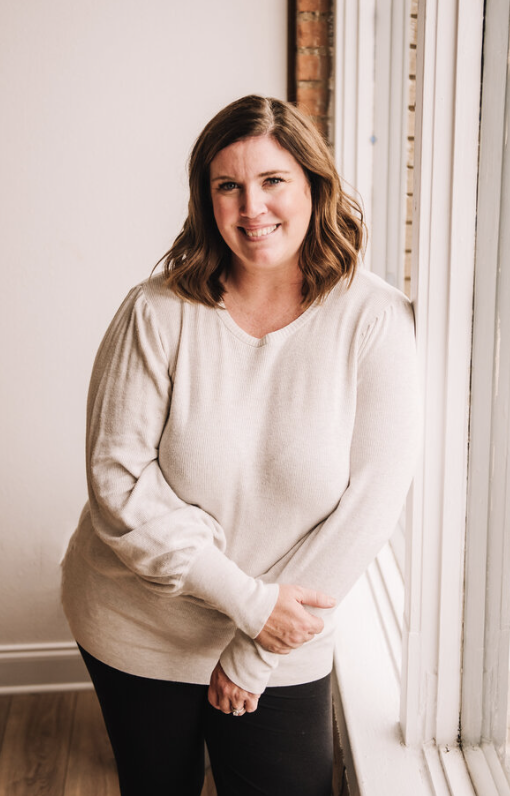IT’S SEASON FOUR, EVERYONE! This year we are doing quarterly themes – and I’m so excited to bring you the theme for the first quarter: THE ENNEAGRAM. I basically do not shut up about it any time it’s brought up, so dedicating such a big portion of the year to this is VERY on brand. Today’s episode is with the fabulous Sarajane Case and we are talking all about how to use the Enneagram in your Business.
Using The Enneagram In Your Business with Sarajane Case
Sarajane Case is a trained Enneagram teacher, author of the popular self-help book The Honest Enneagram and Host of the Enneagram & Coffee Podcast. She helps people to find their perfect balance between self-care and growth so they can release shame on their path to doing less harm. Her new book – The Enneagram Letters: A poetic exploration of who you thought you had to be – released on October 18th and is now available wherever you buy your books.
TUNE IN + SUBSCRIBE TO YOUR FAVORITE PLATFORM:
Apple Podcast | Spotify | Stitcher | Google Play
This episode is sponsored by Freebeat!! ALSO – Get even MORE off than I mentioned in the episode! Freebeat upgraded my code from $50 off to $100 off just for my audience. You can get $100 off your purchase with code TAYLOR100 on top of any sales currently going on! Shop the Boom Bike HERE!
Show Notes:
- What does hustle like a mother mean to you?
- I think moms are the most underrated group of people, like in terms of capacity and capability, right? When I think about hustle like a mother, I’m like, oh, that means full-on being able to handle anything that comes your way. I think it’s an exciting opportunity to pull back a little bit right? To slow down and to see I am capable, but that doesn’t mean I have to be the only one who’s capable.
- I would love to hear about your story. How did you get started with the Enneagram?
- I think I found it like many of us do. A friend of mine I think heard my type pattern as I was talking and was like, have you found the Enneagram? At that time though I didn’t know the Enneagram really well. So I thought all sevens are just happy all the time, which is a very seven belief that that’s even possible. So I thought I can’t be a seven cuz I’m not happy all the time. So I went on a journey of finding my own type and it took me two years. And through that I really dove in deep into every single Enneagram type just trying to find myself in the system.
- At the time I was coaching, so I was actually doing burnout prevention and recovery coaching. It was a really cool job. I loved that job. I was working with so many people on their behaviors, right? So how do we set boundaries? How do we charge enough? How do we create systems that make us give us time to work less? But the Enneagram helped me to get into why they were repeating these patterns. Why wouldn’t you raise your rates? Why were you working so much? Why did you keep adding offerings? And so it just helped me so much in that work that I just became honestly obsessed with the system. It was all I would talk about and was annoying all of my friends and family. Eventually, a friend of mine was like, I love you, please find an outlet for this. I need you to have a place to play. I started studying the Enneagram even more, just kind of saying, okay, this is really something I’m gonna do. I created my Instagram account, I got certified with my first initial training and it’s kind of gone on from there.
- When it comes to Enneagram in business, how do you believe that you can use this to kind of help yourself succeed?
- I think the Enneagram is a really fun example of how our greatest strengths are also sometimes our greatest weakness, right? The Enneagram can really tell us this is what you do naturally very well. And then when that’s used at the wrong time, or overused or used when not necessary, it can actually hold you back or inhibit you. So when I think about using the Enneagram in terms of business, we’re really looking at, okay, where do I naturally thrive? But then also when am I using that at the wrong time, the wrong place and in the wrong way and it actually causes harm.
- When you are talking about business when it comes to the Enneagram, what are some resources that you feel like are really helpful for people getting started and they wanna use this to their benefit to kind of go and look for?
- Obviously I’m gonna tell you to read my book [The Honest Enneagram]. Especially for this conversation. Like obviously I want you to buy The Enneagram Letters if you’re someone who’s like, let’s go deep, let’s do it right now. But The Honest Enneagram, it’s much more strategic. It’s like, what are your strengths? What are your blind spots? How are we gonna do this growth work? And how are you gonna be more creative? Other places, you know, I love to go to workshops. I just want everyone to go to in-person workshops.
- I didn’t even know Enneagram workshops existed. So where are some good places we could find those?
- I love the ones from the narrative tradition. Obviously, I want you to come to mine. Most of mine are online, but I think the narrative tradition is really cool. And you can find those at the narrative school website. They do this thing called panels where you have like nine, you know, or as many people as you can, from the type structure. And so you can watch the patterns of, you know, you said you have a row of fives all talking from their perspective, answering the same questions and you can see just the similarities in the way that they approach the world or the way they think or the way they operate.
- When we’re talking about success in particular, how can we kind of uncover what that looks like for each of us and utilize that with the Enneagram in a healthy way?
- I think this is where I love to think of the Enneagram as who you think you have to be because it’s not who you get to be, right? So a lot of times we define success by who we think like by our Enneagram type, which is who we think we have to be. So some of us believe we have to be morally above approach. Some of us believe we have to be successful in terms of our society. Some believe they have to be significant. So oftentimes we are determining it as we’re calling it success, right? If I’m happy, if I’m satisfied, then I am successful. And to some degree, yes, of course that will always be there.I will probably always define success as freedom and as satisfaction and its happiness. But we’re often settling for the illusion of the thing instead of the real thing.
- Would you be able to give us a little bit of insight to the types and kind of how they operate typically in business?
- One – Type one is the perfectionist or the reformer. I like reformer as a title better because it’s like this fixation on what could constantly be improved. Their focus of attention and the pressure they feel is to be morally above approach. They wanna be good, they wanna do the right thing, they wanna be right, they wanna be just. So in business, oftentimes they get caught up in the details of making sure there’s no stone left unturned, no detail missed. There’s also a sense of how can I be morally perfect, how can I make sure that I’m addressing every social issue? How can I make sure that I’m doing everything as consciously as possible? Ones really do struggle as well to know when responsibility ends and pleasure gets to begin. So they tend to moderate pleasure, which can lead to burnout.
- Two – So we get to two, which is the helper. Their focus of attention, the pressure they carry is to be lovable and likable. They think love is earned, right? So if I give, then I will receive. Oftentimes they get really caught up in people-focused tasks. So what’s going to offer me the most appreciation, the most gratitude, what’s gonna be valued by other people most?
- Three – Threes are the achiever. Their pressure they carry is to be successful in the eyes of the world. And through that, you know, they tend to focus on getting to the goal as the main objective. There’s this pressure to just keep going and never stop going. And there’s never really an end to that until they start to realize the journey is the destination, right? We’re in it already. And so we have to find a way to start enjoying our lives right now instead of, I’ll enjoy my life when I achieve X, Y, or Z.
- Four – Four is the individualist. These types are our romantics. They’re kind of known as the creative type. Their focus of attention and their pressure they carry is to be significant and to find and express their identity. And the way this operates in businesses oftentimes our type fours are the ones who want to just be the thing. They want a title. Like you are an artist, you are a writer, you are, you know, whatever the title is that they’re seeking. So sometimes our fours can get caught up in either I wanna be like a significant success or I would rather be like a tragic failure. They feel like either they would be immediately great or they’re not qualified.
- Five – Then we have type five, the investigator. This type carries the pressure of being informed. They fear being incompetent or incapable. So they wanna get all the information they can to be as informed and as prepared as possible. In business, fives tend to be so good at logical problem solving. They do really well with a project. If they’re not people-facing, if you just let them go on their own and work on a project, they’re gonna do a great job. They struggle the most with people-facing tasks. Customer service is gonna be really frustrating for them. So if they can outsource those tasks, they’re gonna thrive in that environment.
- Six – Type six is the loyalist. Their focus of attention is on being supported and being certain and sure. This type tends to really appreciate the middle. I’ve heard sixes say to me like, I don’t wanna be the boss, but I wanna hire the boss. There’s like so much safety in just having a job and doing your job and doing your job well. Sixes actually do really well in creative fields, and a lot of people in corporate environments tend to be sixes cuz they do a good job in the implementation phase. You don’t want a six in the brainstorming room, but you definitely want them in the room where we’re thinking what could go wrong and how do we prepare for it?
- Seven – Our type sevens are the enthusiasts. The pressure they carry is to be constantly satisfied and happy and they flee from emotional pain. So in business, the biggest hold up for them is allowing it to suck. Every job is gonna have something – boring tasks, things about it that are hard. Oftentimes when those moments where things suck come up, sevens start to think, oh, I must be settling. What I have learned to do instead of pivoting right then is setting myself what I call like a “commitment deadline.” So okay, I commit to this for six months, and then at that six-month mark when I’m not in my feelings, when I’m not like feeling frustrated, then I can make the decision if I still wanna move on. I highly recommend just kind of waiting and not quitting, not making decisions based off of that reactivity.
- Eight – Then we get to type eight, which is the challenger. These types feel the pressure to be strong, to not admit their weakness. In business, they’re like “can-do” attitude, right? Eights are driven. They’re not gonna stop. They’re gonna push through difficulties. Often when I talk to eights about burnout especially, they’re like, “yeah, I got really sick. And that’s when I found out that I couldn’t do what I was doing anymore.” So I always plead to eights to like, don’t make your body scream at you. Find some way to listen to your body, to l understand your limitations and to slow down on a regular basis before you get to that point where you’re like in the hospital because you ignored all the signs and warnings.
- Nine – Our final type is type nine, the peacemaker. This type is carrying the pressure to be easy to get along with. They tend to kind of numb themselves down. They tend to numb emotion, they tend to kind of hide the truth of who they are. Their biggest struggle is knowing when to take action and what to take action on. They struggle with prioritization and then procrastination. Break all of your goals down into the tiniest teeniest, most manageable steps, almost laughably small. And then just take them one at a time in an order.
- I would love for you to leave us your last favorite way to kind of use the Enneagram as a business owner. What are some good action steps that we can all take away with us right now and go forth and utilize from this episode today?
- I think the biggest tip I would say is, as you read about the Enneagram, you’re gonna learn that your number goes to a certain type in stress. And I think that to me is my favorite tool in the Enneagram. I love that ability to really recognize when you need self-care.
- Is there anything else that you wanna leave us before we wrap this episode up?
- If you are listening and you wanna dive deeper, definitely grab The Honest Enneagram and The Enneagram Letters. I think they’re a great little pairing and they look good together, too. They’re meant to go together.
- Where can we find you online?
- Website: http://sarajanecase.com/
- Book: http://theenneagramletters.com/
- Instagram: @sarajanecase / @enneagramandcoffee
- Podcast: Enneagram & Coffee // Apple Podcasts / Spotify
















